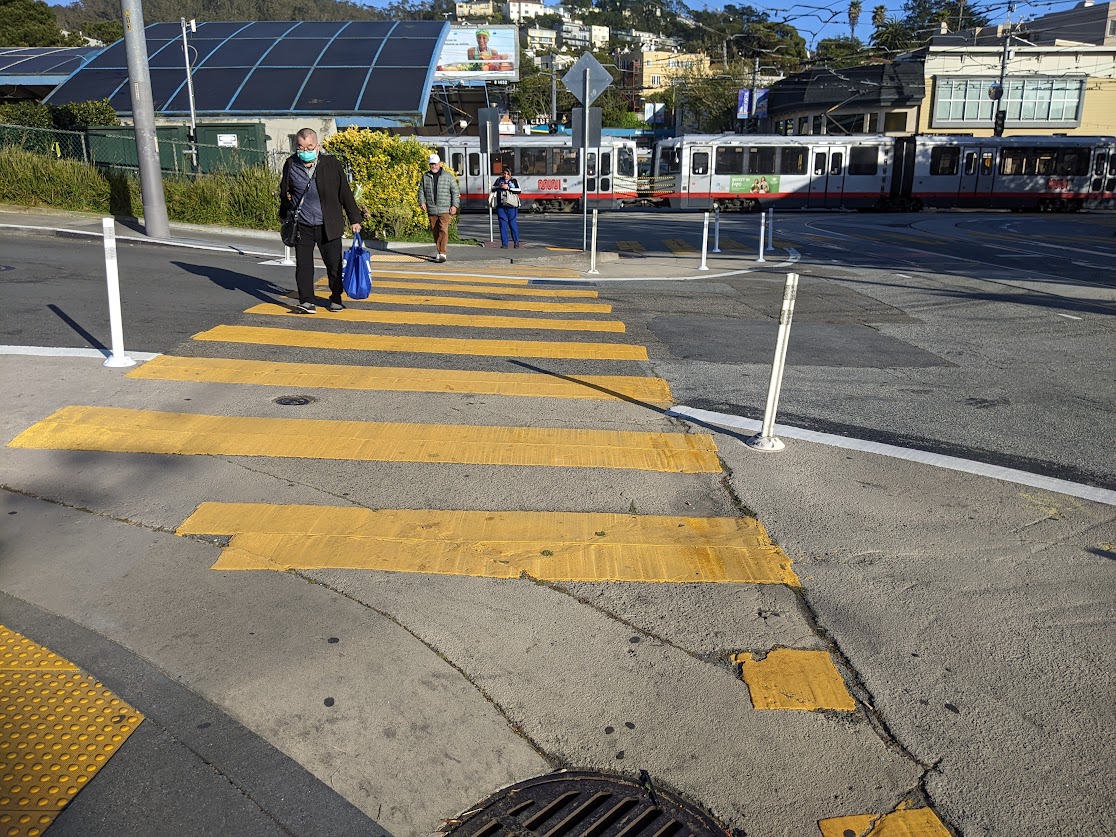Civil Rights Complaint Filed Against BART Over Oak Airport Connector
9:29 AM PDT on September 4, 2009
 Oaklan Airport BART Station rendering. Image: BART
Oaklan Airport BART Station rendering. Image: BARTTransit advocates and community groups have filed a complaint (PDF) with the Federal Transit Administration (FTA), charging that BART has not complied with federal civil rights obligations in its planning of the Oakland Airport Connector (OAC). The move by Public Advocates Inc. on behalf of TransForm, Urban Habitat and Genesis, comes after concerns over the controversial project fell on deaf ears at both BART and the Metropolitan Transportation Commission.
In its current form, the 3.2-mile OAC is projected to cost between $522
million and $552 million, with a six-dollar one-way fare, and no stops
between its start point at the Oakland Coliseum BART station and its
terminus at Oakland International Airport.
Since BART will be using federal dollars to pay for the project, including stimulus funds, it is required to comply with the FTA's civil rights regulations. The complaint argues that BART has not properly considered the financial impact the project will have on low-income residents near the proposed airport train, and has not adequately reviewed alternatives, including a proposal by TransForm to run a bus rapid transit line through the corridor instead, at a capital cost of $45-60 million, with a low fare or no fare and one intermediate stop.
The complaint also contends that since BART first evaluated the OAC in 2002, the project's details have changed dramatically. The original proposal, as evaluated at that time, included multiple intermediate stops, a much lower fare, and a higher price tag. As part of this review, a "Quality Bus" was evaluated as an alternative project, but was disregarded partially because of travel time concerns. Since then, significant road improvement projects at the airport have reduced the projected travel time for buses, but BART has not completed an updated review. The bus option was also evaluated without intermediate stops, diminishing projections for increased ridership.
Richard Marcantonio, a managing attorney at Public Advocates, said the six-dollar one-way fare, a 100 percent increase from the current three-dollar AirBART bus fare, would make it much harder for low-income airport employees to use the OAC.
A second major issue, he said, is "the fact that the project that was originally brought to the Alameda County voters [in 2000] not only had a much, much smaller price tag [of about $130 million,] but also included intermediate stops so that this project was not just going to benefit people who were going to get on airplanes, but would also benefit people who could get to jobs."
"As part of the re-scoping of the project in order to meet all of the problems it's facing, because of all the financial challenges, they've eliminated those stops. So they never actually did an analysis that compared the current project that they're looking at with any range of feasible alternatives like the one Transform is proposing."
A BART spokesperson said the agency had not yet thoroughly reviewed the complaint and had no comment at present.
The complaint cites an email from BART staff demonstrating that the TransForm proposal was never seriously evaluated. The complaint said the email, dated May 8, 2009, from OAC project manager Thomas Dunscombe, "urged four separate BART consultants to provide any information 'to put holes in' and 'discredit this 'paper',' stating that 'another delay from the [BART] Board and we are practically dead.'" The email was obtained by TransForm from BART through California's Public Records Act.
Over the protests of TransForm and other community organizations, the MTC approved the allocation of $140 million to the OAC in July, including $70 million in federal stimulus funds, after BART presented a funding plan that included pursuing a Transportation Infrastructure Finance and Innovation Act (TIFIA) loan for up to $150 million. Transit advocates have charged that this will strap BART with too much additional debt at a time when it's struggling to maintain its current operations. Advocates for AC Transit riders have also expressed frustration that flexible components of the funding aren't being used to maintain existing service, which is being dramatically cut due to budget shortfalls.
Marcantonio was hopeful that the Obama Administration's recent call for a renewed focus on civil rights law enforcement in federal agencies will bode well for the complaint. "One of the points that was made is that they have urged all of the federal agencies to get back in the business of enforcing Title VI," said Marcantonio. "That's in fact exactly the enforcement power we're invoking with this complaint."
The FTA will complete an investigation within 180 days if it accepts the complaint, and could withhold ARRA funds and the TIFIA loan if it decides BART has not adequately reviewed alternatives to the project, and its impacts on neighboring low-income communities. In that scenario, BART could be forced to complete an updated review, and fully consider alternatives.
Stay in touch
Sign up for our free newsletter
More from Streetsblog San Francisco
SFMTA Starts West Portal Outreach
Agency presents plans to block traffic from crossing in front of the train station



